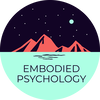|
LLily Le is a Registered Psychologist with a Ph.D. in Counselling Psychology from the University of Alberta. She is dedicated to de-stigmatizing mental health, making care more accessible, and leveraging innovation and technology to enhance clinical processes and outcomes. As DiveThru’s Director of Clinical Innovation, she oversees the clinical side of the company, employing research and clinical expertise to develop, evaluate and refine clinical products and processes. At the moment of recording this interview, Lily was a doctoral candidate in counselling psychology and a Registered Provisional Psychologist in Edmonton. To recharge, Lily enjoys dancing, weightlifting, and hanging out with her dog.
|
|
Meg Berryman is a mother, feminist, coach, facilitator and yoga teacher who helps women liberate themselves from socially prescribed ideals + step into sacred, social leadership. She believes that burnout, relationship breakdowns and career crises are portals into deep individual and planetary healing that centers healthy relating, holistic wellness and earth stewardship. She brings together her 10+ years in social change work, her masters degrees in gender and public health and her experience as a yoga teacher, coach and facilitator to create learning experiences for women seeking radical wellbeing, deep connection and an unshakeable sense of purpose. She is a mother of two girls, and lives, learns and works on unceded Dja Dja Wurrung country in Central Victoria, Australia.
|
Online Portal for Clients
Once we are working together, please use the Owl Practice Client Portal to
|
|
